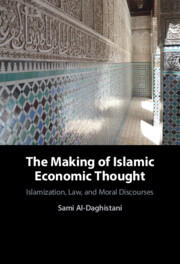Book contents
- The Making of Islamic Economic Thought
- The Making of Islamic Economic Thought
- Copyright page
- Contents
- Figures
- Acknowledgments
- Introduction
- 1 The Force of Revivalism and Islamization
- 2 The Present: Muslim Economists and the Constellation of Islamic Economics
- 3 The Past Perfect: Sharīʿa and the Intellectual History of Islamic Economic Teachings
- 4 The Appraisal: Contemporary Islamic Economics and the Entrenchment of Modernity
- 5 Pluralistic Epistemology of Islam’s Moral Economics
- Conclusion: Moral over Legal, Pluralistic over Monolithic
- Appendix
- Bibliography
- Index
5 - Pluralistic Epistemology of Islam’s Moral Economics
Published online by Cambridge University Press: 01 November 2021
- The Making of Islamic Economic Thought
- The Making of Islamic Economic Thought
- Copyright page
- Contents
- Figures
- Acknowledgments
- Introduction
- 1 The Force of Revivalism and Islamization
- 2 The Present: Muslim Economists and the Constellation of Islamic Economics
- 3 The Past Perfect: Sharīʿa and the Intellectual History of Islamic Economic Teachings
- 4 The Appraisal: Contemporary Islamic Economics and the Entrenchment of Modernity
- 5 Pluralistic Epistemology of Islam’s Moral Economics
- Conclusion: Moral over Legal, Pluralistic over Monolithic
- Appendix
- Bibliography
- Index
Summary
Chapter 5 introduces a new hermeneutical approach to the study of economic thought in Islamic tradition as a multifaceted field. This chapter is concerned with the plural and polyvalent methodology of studying the phenomenon of economic thought in Islamic tradition and Sharīʿa through a multitude of approaches in what I call the plural epistemology of Islam’s moral economy, which advocates for a multifaceted hermeneutical reading of the subject.
- Type
- Chapter
- Information
- The Making of Islamic Economic ThoughtIslamization, Law, and Moral Discourses, pp. 256 - 273Publisher: Cambridge University PressPrint publication year: 2022

